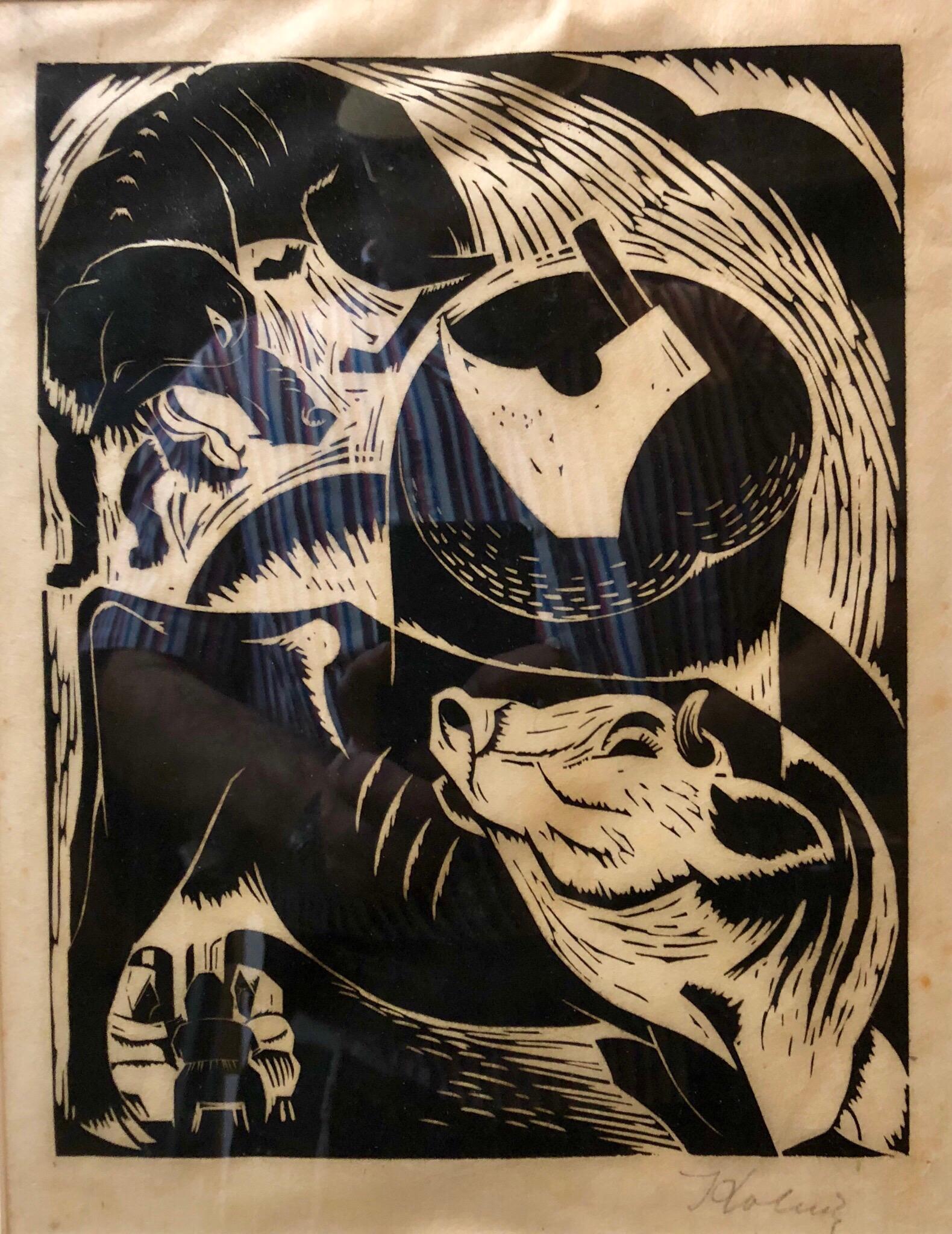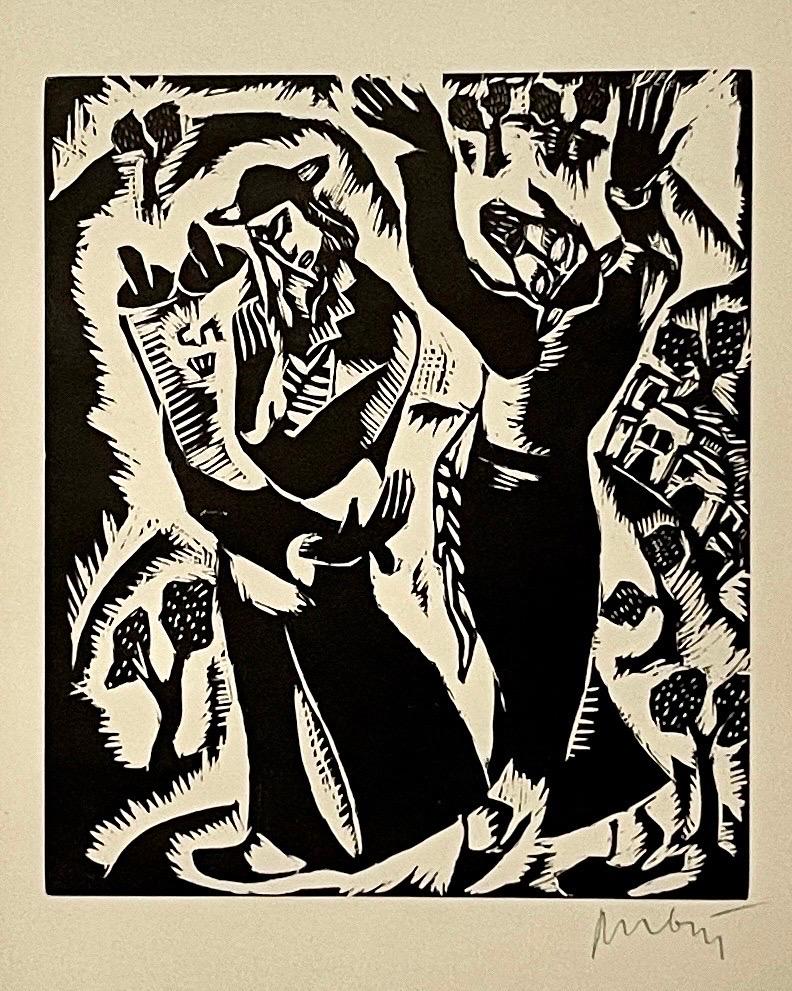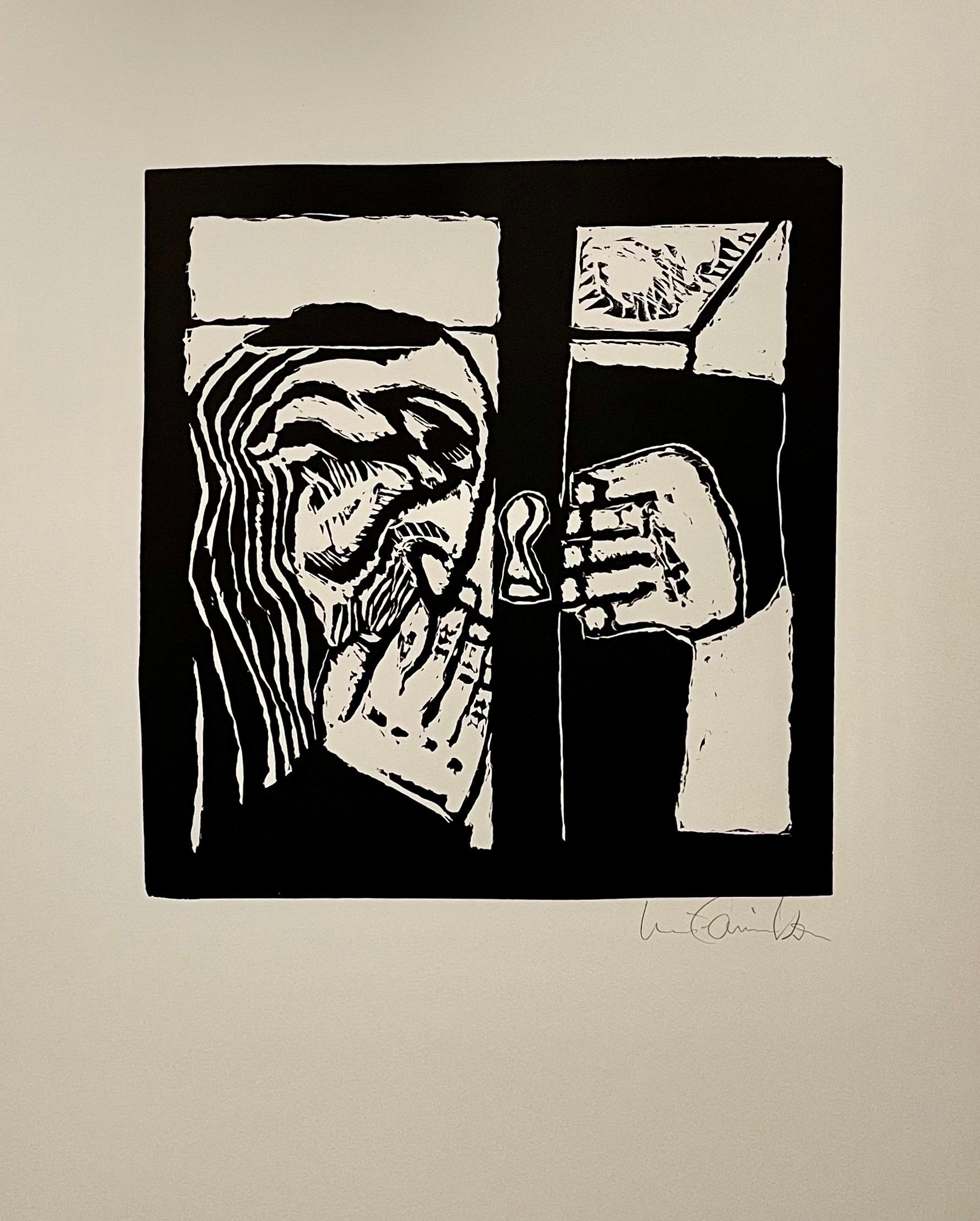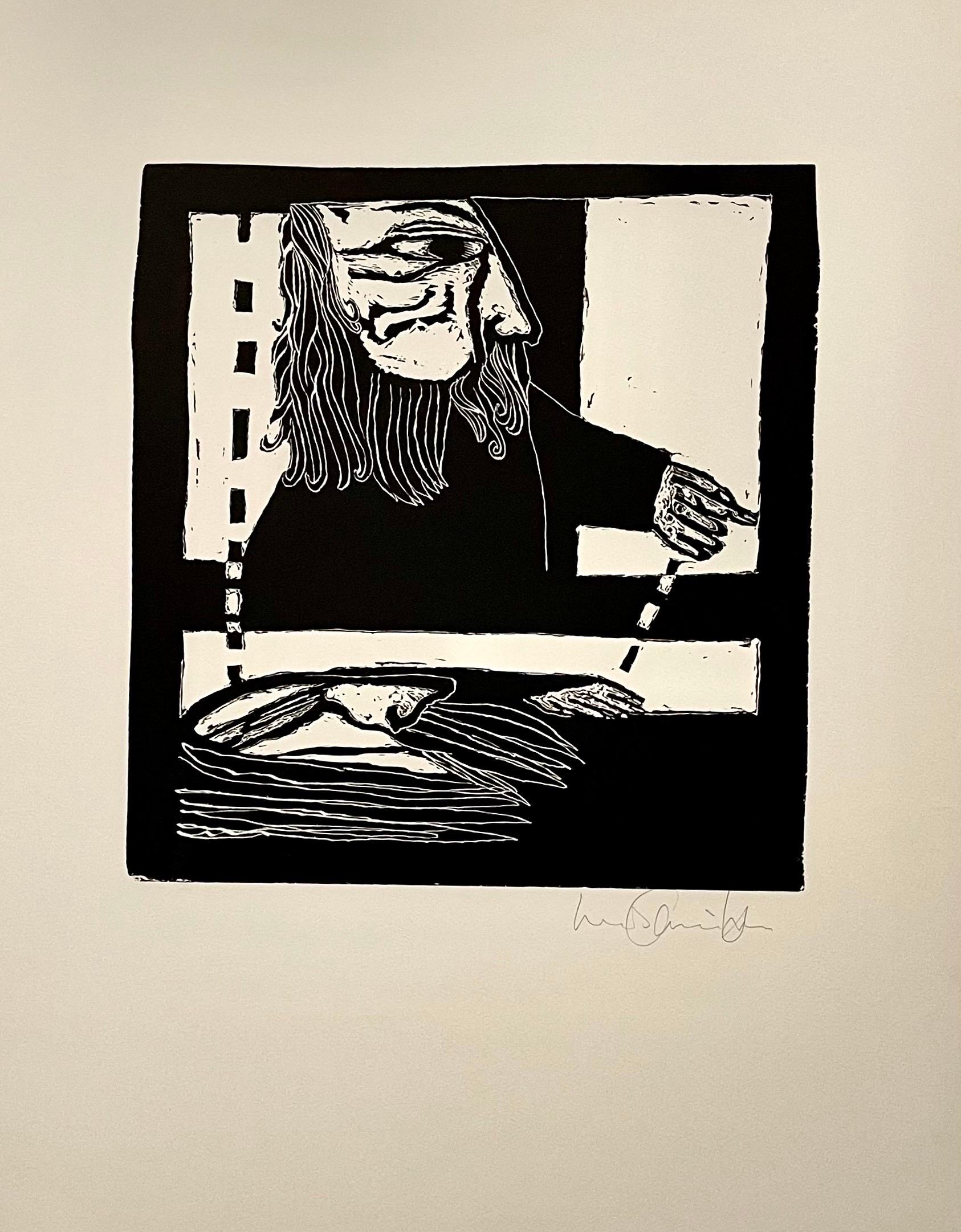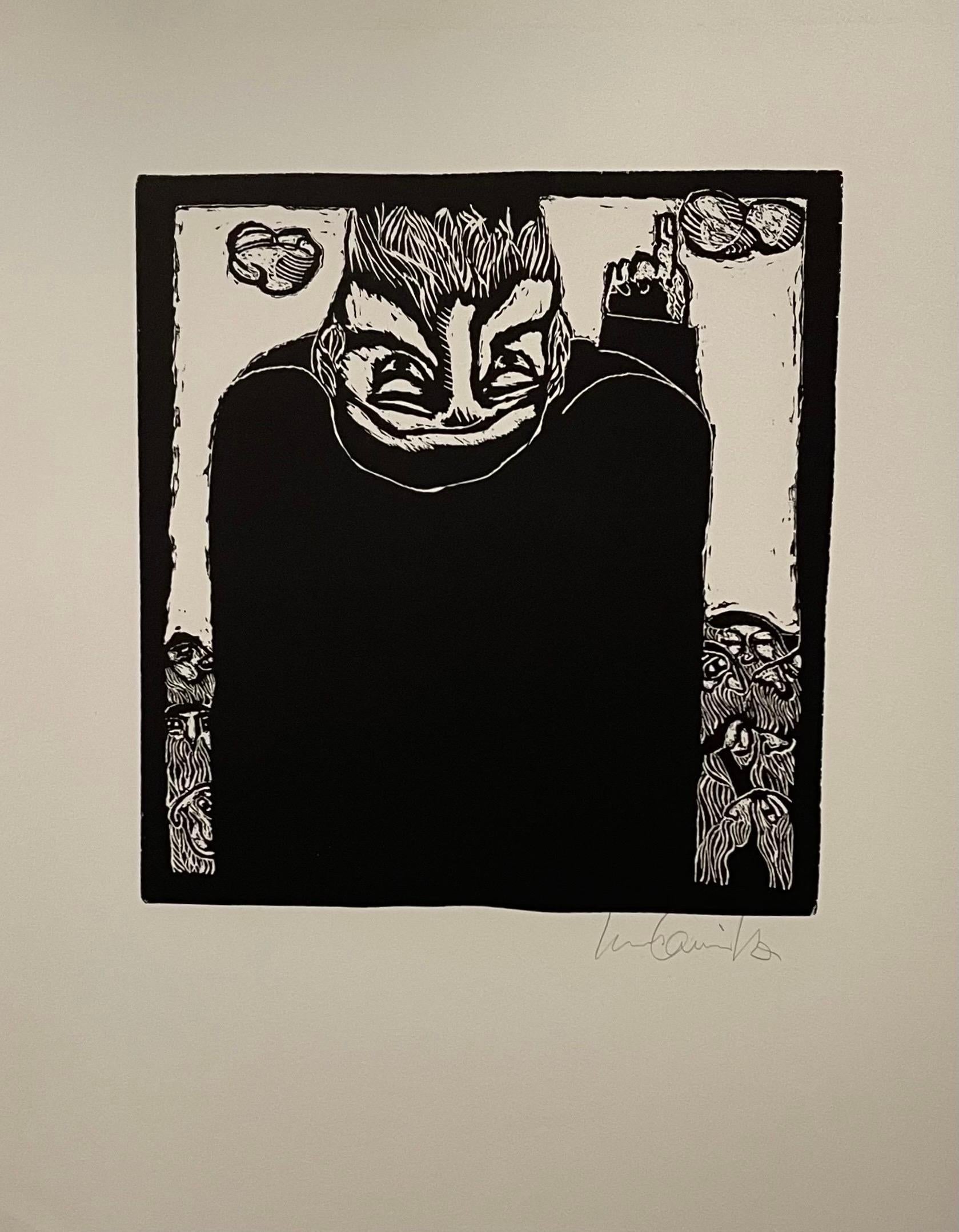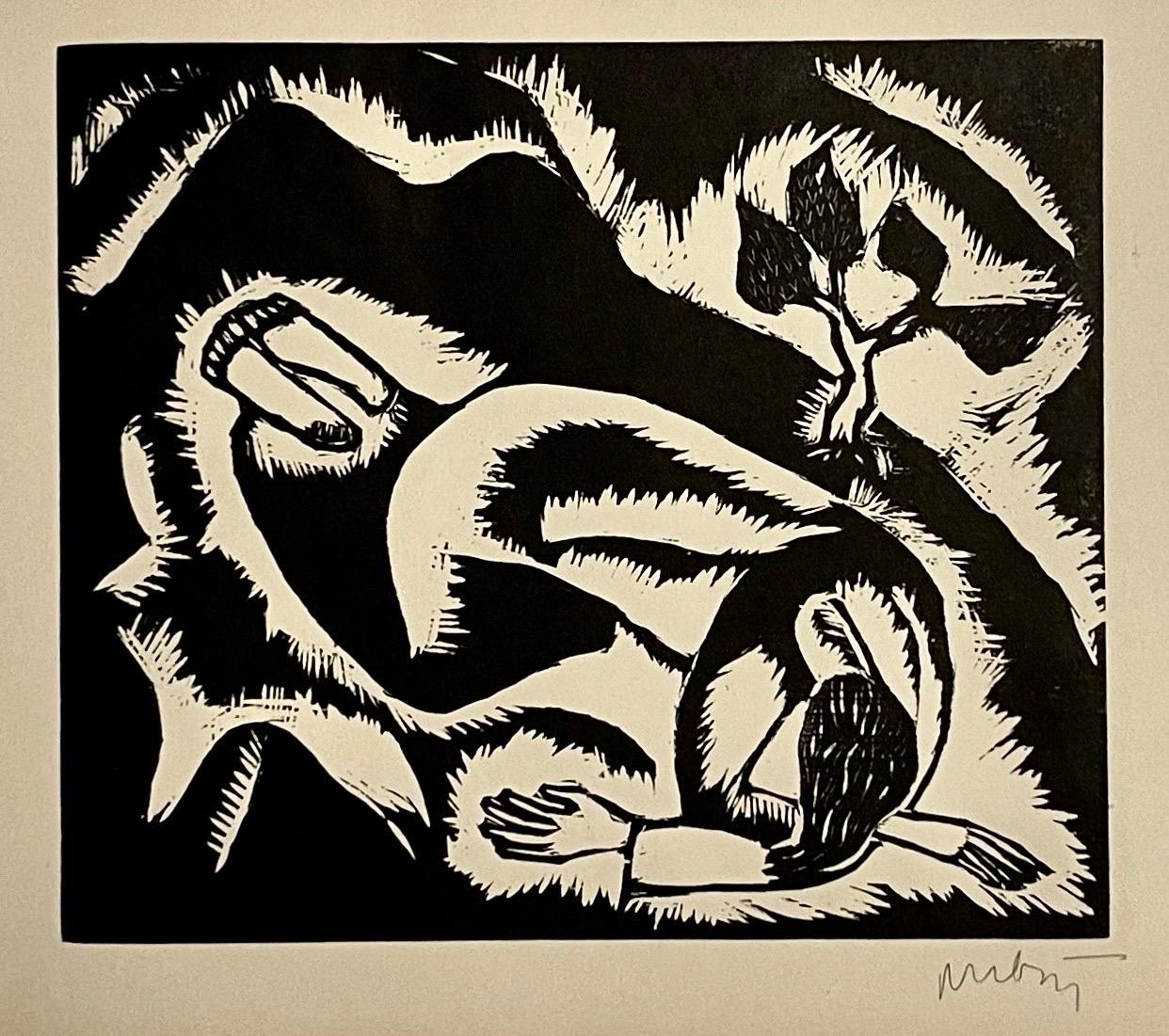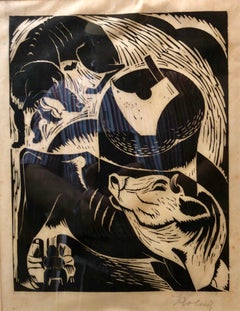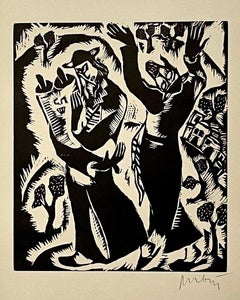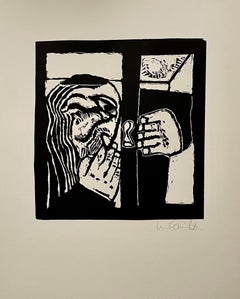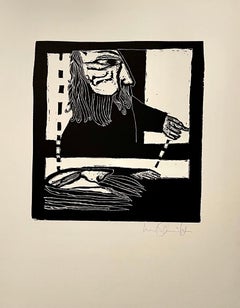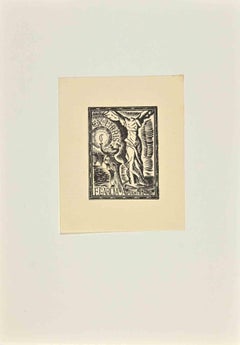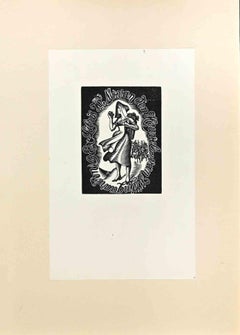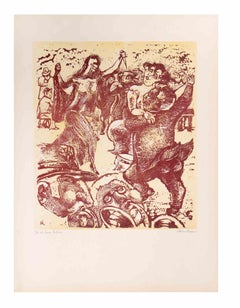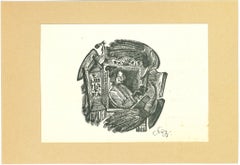Items Similar to Shana Tova, New Year Woodcut Israeli Judaica Early Bezalel School Woman Artist
Want more images or videos?
Request additional images or videos from the seller
1 of 9
Shulamith Wittenberg MillerShana Tova, New Year Woodcut Israeli Judaica Early Bezalel School Woman Artist
$500
£376.24
€434.96
CA$706.01
A$765.53
CHF 406.26
MX$9,428.43
NOK 5,035.28
SEK 4,752.15
DKK 3,246.66
About the Item
Signed in Hebrew and English. Titled. Size matted 16 x 12, image is 3.5x5.5 inches.
Shulamit Wittenberg Miller
Born 1908 in Jerusalem, attended Bezalel Art School, Jerusalem, under Prof. Boris Schatz; advanced studies in Paris at the Académie Montparnasse under the cubist painter André Lhote. She had a solo show put on by Narkiss in the original Bezalel School in Palestine along with Anna Ticho and Hana Orloff. In 1933, married Rabbi Meyer Miller and moved to the U.S.A. that year, residing in Greenwich CT until 1950.
Education
1925-29 Bezalel Art School, Jerusalem, with Boris Schatz, Abel Pann
Academie Montparnasse, Paris, France, Advanced studies, with Andre L'Hote.
In 1950 Shulamith Wittenberg-Miller moved to Durban, South Africa as her husband had been appointed the spiritual leader of the Durban Reform Congregation which he was to build up in a 20 year ministry. She continued to paint and exhibit in South Africa and abroad.
Selected exhibitions
First Tower of David Exhibition, Jerusalem, April, 1921
SA Association of Arts, Cape Town - Paintings and etchings - March, 1962
Gallery 101, Johannesburg ("Women of the Bible") (copper etchings) – 27th April - 14th May, 1964
Durban Art Gallery, Durban - 22nd September to 3rd October, 1965
SA Association of Arts, Pretoria - Republic Festival Exhibition, 1966 (May) cat. 200
Durban - 8th to 22nd May, 1968 (paintings)
Durban Jewish Club, Durban - 23rd August, 1975 (etchings)
1934 :Paintings and woodcuts by Shulamith Wittenberg, the young Palestinian artist who exhibited earlier in the season at the Roerich Museum, are being shown this week daily from 2 P.M. to 9 P.M. at the Society for the Advancement of Judaism, 15 West Eighty-sixth Street.
Works in Public Museums
Brooklyn Museum, Brooklyn NY USA
University of California UCLA, Berkeley CA
The Magnes Collection of Jewish Art and Life
The Bancroft Library
New York Public Library – The Print Collection
Hebrew Union College Jewish Museum, Cincinnati OH
Spertus Museum, Spertus Institute of Jewish Studies, Chicago IL
Durban Art Gallery, Durban
WHO WAS WHO IN AMERICAN ART, 1564-1975 (Peter Hastings Falk, Editor), 1999
Books published and illustrated by Shulamith W Miller
"I remember Jerusalem“ (Olive Tree Press, West Hempstead N.Y.), 1983
“Rabbi Meyer Miller 1903-1985 – a remembrance: poems and sketches” (memorial booklet, privately printed, USA), 28 pp., abt. 1986
- Creator:Shulamith Wittenberg Miller (1908 - 1995)
- Dimensions:Height: 16 in (40.64 cm)Width: 12 in (30.48 cm)
- Medium:
- Movement & Style:
- Period:
- Condition:good. minor wear. please see photos. mat has toning.
- Gallery Location:Surfside, FL
- Reference Number:1stDibs: LU38214002642
About the Seller
4.9
Platinum Seller
Premium sellers with a 4.7+ rating and 24-hour response times
Established in 1995
1stDibs seller since 2014
1,807 sales on 1stDibs
Typical response time: 1 hour
- ShippingRetrieving quote...Shipping from: Surfside, FL
- Return Policy
Authenticity Guarantee
In the unlikely event there’s an issue with an item’s authenticity, contact us within 1 year for a full refund. DetailsMoney-Back Guarantee
If your item is not as described, is damaged in transit, or does not arrive, contact us within 7 days for a full refund. Details24-Hour Cancellation
You have a 24-hour grace period in which to reconsider your purchase, with no questions asked.Vetted Professional Sellers
Our world-class sellers must adhere to strict standards for service and quality, maintaining the integrity of our listings.Price-Match Guarantee
If you find that a seller listed the same item for a lower price elsewhere, we’ll match it.Trusted Global Delivery
Our best-in-class carrier network provides specialized shipping options worldwide, including custom delivery.More From This Seller
View AllPolish French Expressionist Judaica Woodcut Had Gadya from Passover Haggadah
By Arthur Kolnik
Located in Surfside, FL
Arthur Kolnik, Jewish painter and printmaker Ivano-Frankivsk (Ukraine) 1890 - Paris (France) 1972
Arthur Kolnik was born in Stanislavov, a small town in Galicia, which was then part of the Austro-Hungarian Empire. His father, who was originally from Lithuania, worked as an accountant and his mother, who was originally from Vienna, ran a shop. In 1905, he discovered Yiddish literature in Czernowitz, on the occasion of the first conference on Yiddish language, which was organized by several writers including I. L. Peretz, Cholem Aleichem, Shalom Asch, and Nomberg.
In 1909, Kolnik joined the School of Fine Arts in Krakow and took classes taught by Jacek Malezcewski and Joseph Mehoffer, a portrait painter and an artist who produced stained-glass windows in Fribourg (Switzerland).
He was mobilized in the Austrian army in 1914. He was wounded in 1916 and repatriated to Vienna, where he met the Judaic painter Isidor Kaufmann. In 1919, Kolnik settled in Czernowitz, which was then annexed by Romania. There, he met writer and poet Itzik Manger and storyteller Eliezer Steinberg for whom he produced several illustrations. In 1920, Kolnik left for the United States, bringing fifty paintings...
Category
20th Century Expressionist Figurative Prints
Materials
Woodcut
Rare 1923 Cubist Reuven Rubin Woodcut Woodblock Print Israeli Hasidic Judaica
By Reuven Rubin
Located in Surfside, FL
This is from the original first edition 1923 printing. there was a much later edition done after these originals.
These are individually hand signed in pencil by artist as issued.
This listing is for the one print. the other documentation is included here for provenance and is not included in this listing.
The various images inspired by the Jewish Mysticism and rabbis and mystics of jerusalem and Kabbalah is holy, dramatic and optimistic Rubin succeeded to evoke the spirit of life in Israel in those early days.
They are done in a modern art style influenced by German Expressionism, particularly, Ernst Barlach, Ernst Ludwig Kirchner, and Franz Marc, as introduced to Israel by Jakob Steinhardt, Hermann Struck and Joseph Budko.
Reuven Rubin 1893 -1974 was a Romanian-born Israeli painter and Israel's first ambassador to Romania.
Rubin Zelicovich (later Reuven Rubin) was born in Galati to a poor Romanian Jewish Hasidic family. He was the eighth of 13 children. In 1912, he left for Ottoman-ruled Palestine to study art at Bezalel Academy of Art and Design in Jerusalem. Finding himself at odds with the artistic views of the Academy's teachers, he left for Paris, France, in 1913 to pursue his studies at the École Nationale Supérieure des Beaux-Arts. He was of the well known Jewish artists in Paris along with Marc Chagall and Chaim Soutine,
At the outbreak of World War I, he was returned to Romania, where he spent the war years.
In 1921, he traveled to the United States with his friend and fellow artist, Arthur Kolnik. In New York City, the two met artist Alfred Stieglitz, who was instrumental in organizing their first American show at the Anderson Gallery. Following the exhibition, in 1922, they both returned to Europe. In 1923, Rubin emigrated to Mandate Palestine.
Rubin met his wife, Esther, in 1928, aboard a passenger ship to Palestine on his return from a show in New York. She was a Bronx girl who had won a trip to Palestine in a Young Judaea competition. He died in 1974.
Part of the early generation of artists in Israel, Joseph Zaritsky, Arieh Lubin, Reuven Rubin, Sionah Tagger, Pinchas Litvinovsky, Mordecai Ardon, Yitzhak Katz, and Baruch Agadati; These painters depicted the country’s landscapes in the 1920s rebelled against the Bezalel school of Boris Schatz. They sought current styles in Europe that would help portray their own country’s landscape, in keeping with the spirit of the time. Rubin’s Cezannesque landscapes from the 1920s were defined by both a modern and a naive style, portraying the landscape and inhabitants of Israel in a sensitive fashion. His landscape paintings in particular paid special detail to a spiritual, translucent light. His early work bore the influences of Futurism, Vorticism, Cubism and Surrealism.
In Palestine, he became one of the founders of the new Eretz-Yisrael style. Recurring themes in his work were the bible, the prophet, the biblical landscape, folklore and folk art, people, including Yemenite, Hasidic Jews and Arabs. Many of his paintings are sun-bathed depictions of Jerusalem and the Galilee. Rubin might have been influenced by the work of Henri Rousseau whose naice style combined with Eastern nuances, as well as with the neo-Byzantine art to which Rubin had been exposed in his native Romania. In accordance with his integrative style, he signed his works with his first name in Hebrew and his surname in Roman letters.
In 1924, he was the first artist to hold a solo exhibition at the Tower of David, in Jerusalem (later exhibited in Tel Aviv at Gymnasia Herzliya). That year he was elected chairman of the Association of Painters and Sculptors of Palestine. From the 1930s onwards, Rubin designed backdrops for Habima Theater, the Ohel Theater and other theaters.
His biography, published in 1969, is titled My Life - My Art. He died in Tel Aviv in October 1974, after having bequeathed his home on 14 Bialik Street and a core collection of his paintings to the city of Tel Aviv. The Rubin Museum opened in 1983. The director and curator of the museum is his daughter-in-law, Carmela Rubin. Rubin's paintings are now increasingly sought after. At a Sotheby's auction in New York in 2007, his work accounted for six of the ten top lots. Along with Yaacov Agam and Menashe Kadishman he is among Israel's best known artists internationally. Education
1912 Bezalel Academy of Arts and Design, Jerusalem
1913-14 École des Beaux Arts, Paris and Académie Colarossi, Paris
Select Group Exhibitions
Eged - Palestine Painters Group Eged - Palestine Painters Group, Allenby Street, Tel Aviv 1929
Artists: Chana Orloff, Abraham Melnikoff, Rubin, Reuven Nahum Gutman, Sionah Tagger,Arieh Allweil,
Jewish Artists Association, Levant Fair, Tel Aviv, 1929
Artists: Ludwig Blum,Eliyahu Sigad, Shmuel Ovadyahu, Itzhak Frenel Frenkel,Ozer Shabat, Menahem Shemi...
Category
1920s Abstract Figurative Prints
Materials
Woodcut
Latin American Judaica Conceptual Chassidic Art Modern Woodcut Luis Camnitzer
By Luis Camnitzer
Located in Surfside, FL
Luis Camnitzer and Martin Buber (1878-1965),
New York: JMB Publishers Ltd, 1970.
Printed at The New York Graphic Workshop.
Hand signed on Arches paper. (Edition 24/100, numbered on Justification page)
Woodblock prints based on folktales from the Hasidic Jewish tradition in Eastern Europe, selected by Camnitzer from the early masters section of Buber’s Die chassidischen Bücher as translated by Olga Marx. German Expressionist style Jewish woodcuts...
Category
1970s Expressionist Figurative Prints
Materials
Woodcut
Latin American Judaica Conceptual Chassidic Art Modern Woodcut Luis Camnitzer
By Luis Camnitzer
Located in Surfside, FL
Luis Camnitzer and Martin Buber (1878-1965),
New York: JMB Publishers Ltd, 1970.
Printed at The New York Graphic Workshop.
Hand signed on Arches paper. (Edition 24/100, numbered on Justification page)
Woodblock prints based on folktales from the Hasidic Jewish tradition in Eastern Europe, selected by Camnitzer from the early masters section of Buber’s Die chassidischen Bücher as translated by Olga Marx. German Expressionist style Jewish woodcuts...
Category
1970s Expressionist Figurative Prints
Materials
Woodcut
Latin American Judaica Conceptual Chassidic Art Modern Woodcut Luis Camnitzer
By Luis Camnitzer
Located in Surfside, FL
Luis Camnitzer and Martin Buber (1878-1965),
New York: JMB Publishers Ltd, 1970.
Printed at The New York Graphic Workshop.
Hand signed on Arches paper. (Edition 24/100, numbered on Justification page)
Woodblock prints based on folktales from the Hasidic Jewish tradition in Eastern Europe, selected by Camnitzer from the early masters section of Buber’s Die chassidischen Bücher as translated by Olga Marx. German Expressionist style Jewish woodcuts...
Category
1970s Expressionist Figurative Prints
Materials
Woodcut
Rare 1923 Cubist Reuven Rubin Woodcut Woodblock Print Israeli Hasidic Judaica
By Reuven Rubin
Located in Surfside, FL
This is from the original first edition 1923 printing. there was a much later edition done after these originals.
These are individually hand signed in pencil by artist as issued.
This listing is for the one print. the other documentation is included here for provenance and is not included in this listing.
The various images inspired by the Jewish Mysticism and rabbis and mystics of jerusalem and Kabbalah is holy, dramatic and optimistic Rubin succeeded to evoke the spirit of life in Israel in those early days.
They are done in a modern art style influenced by German Expressionism, particularly, Ernst Barlach, Ernst Ludwig Kirchner, and Franz Marc, as introduced to Israel by Jakob Steinhardt, Hermann Struck and Joseph Budko.
Reuven Rubin 1893 -1974 was a Romanian-born Israeli painter and Israel's first ambassador to Romania.
Rubin Zelicovich (later Reuven Rubin) was born in Galati to a poor Romanian Jewish Hasidic family. He was the eighth of 13 children. In 1912, he left for Ottoman-ruled Palestine to study art at Bezalel Academy of Art and Design in Jerusalem. Finding himself at odds with the artistic views of the Academy's teachers, he left for Paris, France, in 1913 to pursue his studies at the École Nationale Supérieure des Beaux-Arts. He was of the well known Jewish artists in Paris along with Marc Chagall and Chaim Soutine,
At the outbreak of World War I, he was returned to Romania, where he spent the war years.
In 1921, he traveled to the United States with his friend and fellow artist, Arthur Kolnik. In New York City, the two met artist Alfred Stieglitz, who was instrumental in organizing their first American show at the Anderson Gallery. Following the exhibition, in 1922, they both returned to Europe. In 1923, Rubin emigrated to Mandate Palestine.
Rubin met his wife, Esther, in 1928, aboard a passenger ship to Palestine on his return from a show in New York. She was a Bronx girl who had won a trip to Palestine in a Young Judaea competition. He died in 1974.
Part of the early generation of artists in Israel, Joseph Zaritsky, Arieh Lubin, Reuven Rubin, Sionah Tagger, Pinchas Litvinovsky, Mordecai Ardon, Yitzhak Katz, and Baruch Agadati; These painters depicted the country’s landscapes in the 1920s rebelled against the Bezalel school of Boris Schatz. They sought current styles in Europe that would help portray their own country’s landscape, in keeping with the spirit of the time. Rubin’s Cezannesque landscapes from the 1920s were defined by both a modern and a naive style, portraying the landscape and inhabitants of Israel in a sensitive fashion. His landscape paintings in particular paid special detail to a spiritual, translucent light. His early work bore the influences of Futurism, Vorticism, Cubism and Surrealism.
In Palestine, he became one of the founders of the new Eretz-Yisrael style. Recurring themes in his work were the bible, the prophet, the biblical landscape, folklore and folk art, people, including Yemenite, Hasidic Jews and Arabs. Many of his paintings are sun-bathed depictions of Jerusalem and the Galilee. Rubin might have been influenced by the work of Henri Rousseau whose naice style combined with Eastern nuances, as well as with the neo-Byzantine art to which Rubin had been exposed in his native Romania. In accordance with his integrative style, he signed his works with his first name in Hebrew and his surname in Roman letters.
In 1924, he was the first artist to hold a solo exhibition at the Tower of David, in Jerusalem (later exhibited in Tel Aviv at Gymnasia Herzliya). That year he was elected chairman of the Association of Painters and Sculptors of Palestine. From the 1930s onwards, Rubin designed backdrops for Habima Theater, the Ohel Theater and other theaters.
His biography, published in 1969, is titled My Life - My Art. He died in Tel Aviv in October 1974, after having bequeathed his home on 14 Bialik Street and a core collection of his paintings to the city of Tel Aviv. The Rubin Museum opened in 1983. The director and curator of the museum is his daughter-in-law, Carmela Rubin. Rubin's paintings are now increasingly sought after. At a Sotheby's auction in New York in 2007, his work accounted for six of the ten top lots. Along with Yaacov Agam and Menashe Kadishman he is among Israel's best known artists internationally. Education
1912 Bezalel Academy of Arts and Design, Jerusalem
1913-14 École des Beaux Arts, Paris and Académie Colarossi, Paris
Select Group Exhibitions
Eged - Palestine Painters Group Eged - Palestine Painters Group, Allenby Street, Tel Aviv 1929
Artists: Chana Orloff, Abraham Melnikoff, Rubin, Reuven Nahum Gutman, Sionah Tagger,Arieh Allweil,
Jewish Artists Association, Levant Fair, Tel Aviv, 1929
Artists: Ludwig Blum,Eliyahu Sigad, Shmuel Ovadyahu, Itzhak Frenel Frenkel,Ozer Shabat, Menahem Shemi,
First Exhibition of ''Hever Omanim'' First Exhibition of ''Hever Omanim''
Steimatzky Gallery, Jerusalem
1936
Artists:
Gutman, Nachum Holzman, Shimshon Mokady, Moshe Sima, Miron Rubin, Reuven Steinhardt, Jakob Ben Zvi, Zeev Ziffer, Moshe Allweil, Arieh
Group Exhibition Group Exhibition
Katz Art Gallery, Tel Aviv
1939
Artists:
Avni, Aharon Holzman, Shimshon Gliksberg, Haim Gutman, Nachum Ovadyahu, Shmuel Shorr, Zvi Schwartz, Chaya Streichman, Yehezkel Tagger, Sionah Rubin, Reuven
A Collection of Works by Artists of the Land of Israel A Collection of Works by Artists of the Land of Israel
The Bezalel National Museum, Jerusalem
1940
Artists:
Shemi, Menahem Rubin, Reuven Avni, Aharon Mokady, Moshe Jonas, Ludwig Steinhardt, Jakob Ticho, Anna Krakauer, Leopold Gutman, Nachum Budko, Joseph Ardon, Mordecai Sima, Miron Castel, Moshe Pann, Abel Struck, Hermann Gur Arie, Meir Ben Zvi, Zeev Litvinovsky, Pinchas
Artists in Israel for the Defense, Tel Aviv Museum of Art, Helena Rubinstein Pavilion, Tel Aviv 1967
Artists: Avraham Binder, Motke Blum, (Mordechai) Samuel Bak, Yosl Bergner, Nahum Gilboa, Jean David, Marcel Janco, Lea Nikel, Jacob Pins, Esther Peretz...
Category
1920s Abstract Figurative Prints
Materials
Woodcut
You May Also Like
Ex Libris - F.Garcia Aipuente - Woodcut - Mid 20th Century
Located in Roma, IT
Ex Libris - F.Garcia Aipuente is a Modern Artwork realized in Mid 20th Century.
Ex Libris. B.W. woodcut on paper.
The work is glued on cardboard.
Total dimensions: 21x 15 cm....
Category
Mid-20th Century Modern Figurative Prints
Materials
Woodcut
Ex-Libris - Woodcut by Desiré Acket - Mid 20th Century
Located in Roma, IT
Ex-Libris is an Artwork realized in Mid 20th Century, by the Belgian Artist Desiré Acket
Woodcut B./W. print on paper. The work is glued on ivory cardboard.
Total dimensions: 21...
Category
Mid-20th Century Modern Figurative Prints
Materials
Woodcut
The Intruder Lady - Woodcut Print by Mino Maccari - Mid-20th Century
By Mino Maccari
Located in Roma, IT
The Intruder Lady is an Artwork realized by Mino Maccari (1924-1989) in the Mid-20th Century.
Colored woodcut on paper. Hand-signed on the lower, numbered 4/89 specimens and titled...
Category
Mid-20th Century Modern Figurative Prints
Materials
Woodcut
Ex Libris Haeka - Woodcut Print - Early 20th Century
Located in Roma, IT
Ex Libris Haeka is an original Contemporary Artwork realized in the early 20th Century.
Original B/W woodcut print on ivory-colored paper. Sigled on plate on the lower right corner...
Category
Early 20th Century Modern Figurative Prints
Materials
Woodcut
Ex Libris Giorgio Balbi - Woodcut - 1944
By Franco Rognoni
Located in Roma, IT
Ex Libris For Giorgio balbi, realized by Franco Rognoni
It includes passepartout, 30 x 24 cm.
Hand signed and dated on the lower margin.
Good conditions.
Category
Mid-20th Century Modern Figurative Prints
Materials
Paper, Woodcut
Ex Libris - Woman Perfected - Woodcut - Mid-20th Century
Located in Roma, IT
Ex Libris - Woman Perfected is an Artwork realized for Giorgio Balbi in Mid 20th Century.
Woodcut.
Good conditions.
Category
Mid-20th Century Modern Figurative Prints
Materials
Woodcut
More Ways To Browse
Cape Town Paintings
Salvador Dali Flordali
Secession Poster
Sidney Chafetz
Steinlen Cat
Takashi Murakami Korin
Tama Janowitz
Tete Homme Picasso
The Avengers
Triple Self Portrait
Vitraux Pour Jerusalem
Walasse Ting Geisha
Wayland Moore
Whitney Poster
Yoshitoshi Taiso
1930s Woodblock
Ai Weiwei Tree
Alice And Wonderland Salvador Dali
